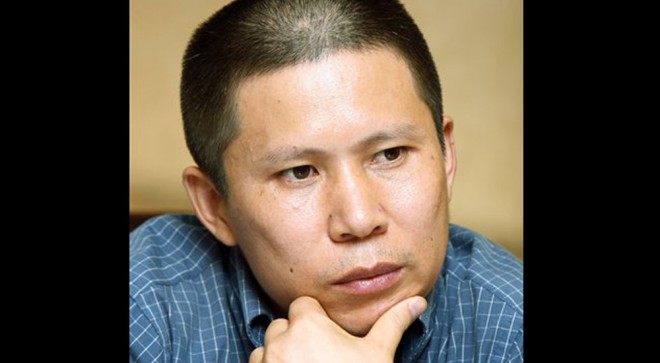
In this July 17, 2009 file photo, legal scholar Xu Zhiyong, is seen at a meeting in Beijing, China. Xu, one of China’s most well-known civil rights advocates, has been formally arrested on charges of disrupting public order, as Beijing cracks down on grassroots efforts to build a civil society that may challenge its rule. Xu, a founder of the loosely organized New Citizens group, has called for people to hold monthly dinners to discuss China’s constitution and other issues. Several citizen activists who want to hold public officials to account and champion the underprivileged stand trial this week in Beijing in cases reflecting an intense campaign under leader Xi Jinping to quash any potential threat to China’s one-party rule. AP
BEIJING — A Beijing court on Sunday sentenced a legal scholar and founder of a social movement to four years in jail for disrupting order in public places, in a case that the U.S. government and other critics say is retribution against his push to fight corruption and create equal educational opportunities.
Amid tight security, the Beijing No. 1 Intermediate People’s Court handed down the verdict against Xu Zhiyong, founder of the loosely knit New Citizens movement.
Police officers — both in uniform and in plainclothes — were stationed near the courthouse, pushing away journalists and taking away Xu’s lawyer when he attempted to speak to the media but not before he denounced the process as unfair.
Xu’s conviction has been expected, as his prosecution is the centerpiece of a crackdown by the ruling Communist Party on grassroots movements that might gain momentum to threaten its rule.
Several more activists have stood trials or are scheduled to appear in court — all on the same charge of disrupting public order.
The prosecutions come amid a broader crackdown since last spring on dissent, including the silencing and detentions of influential bloggers and advocates for minority rights in Tibetan and Muslim Uighur areas.
To seek some room for existence in the one-party state, Xu and his followers purposely kept the movement unstructured so as not to challenge the party’s zero intolerance on organized movements. They downplayed any political appeals and championed causes that were in line with the party’s own stated goals.
Still, Xu’s fledgling New Citizens movement became a target of suppression after it inspired people across the country to gather for dinner parties to discuss social issues and occasionally to unfurl banners in public places in small rallies.
Last year, a document purportedly circulated by the Communist Party’s top leadership warned of the dangers of citizen movements, saying they would eventually form a political opposition force to challenge the party at the grassroots level.
The document characterizes citizens’ calls for public disclosure of officials’ assets as a tactic by anti-China forces in the West and dissidents at home to incite discontent.
Since last April, about 17 members of the New Citizens movement have been arrested. Authorities have targeted a similar group in the southern province of Guangdong, although the Southern Street Movement openly seeks an end to the one-party rule.
During his closed-door court hearing on Wednesday, Xu refused to respond to the prosecutors to protest what he said was an unfair trial. Instead he read out a lengthy manifesto-like closing statement for about 10 minutes before he was cut off.
“Our actions did not violate the rights of any other person, nor did they bring harm to society,” Xu said, according to a copy of the speech released by his lawyers.
“You say we harbored political purposes. Well we do, and our political purpose is very clear, and it is a China with democracy, rule of law, freedom, justice and love.”
Xu expressed his readiness to go to jail, saying he would “openly accept that destiny and the glory that accompanies it.”
“But do not for a second think you can terminate the New Citizens movement by throwing me in jail,” the statement read. “Ours is an era in which modern civilization prevails, and in which growing numbers of Chinese inevitably take their citizenship and civic responsibilities seriously.”